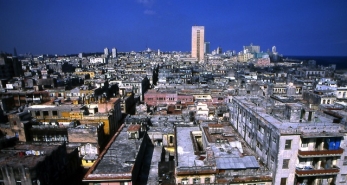 A sign near the tunnel entrance reads: “Welcome to Havana, capital of all Cubans”. It’s a lie. For years, many Cubans have been literally captured and deported from the capital to the cities and towns where they came from originally, as if they were an unwelcome plague.
A sign near the tunnel entrance reads: “Welcome to Havana, capital of all Cubans”. It’s a lie. For years, many Cubans have been literally captured and deported from the capital to the cities and towns where they came from originally, as if they were an unwelcome plague.
“Havana can’t take it anymore…” was the catchphrase of a song made famous long-ago in the 80′s by Los Van Van, whose lyrics, often vulgar, have been a kind of chronicle of what is officially approved to be divulged.
Los Van Van are not just tolerated by the authorities, but belong to an elite club of “artistic” government spokesmen. In fact, the old song was complicit in backing the segregationist government policy of expelling people from the provinces from the capital.
So it goes, in good measure. Cubans “from the interior” are not really welcome in Havana, thanks to official apartheid, which even has a law on the matter: the controversial Decree 217, which regulates the provincials’ residence “permit” in this city.
Of these, the ones whose stay has been approved for work or for “duly justified” reasons, must carry a “transitory” identity document that allows them to move through the streets without the risk of being nabbed by the police (which, paradoxically, is composed almost entirely of individuals who come from “the interior”), and sent by force back to his hometown. By the way, China established a regulation in the 50’s to stop the exodus to the cities, under which a rural worker (mingong), on moving to the city, was forced to apply for an urban residence permit (hukou). This demonstrates that the Cuban system is really nothing new.
At any rate, as a rule, expelled Cubans return to the capital again in a matter of hours. The city, despite its state of poverty, offers more options for survival that the provinces do. It is an endless cycle that brings to life that childhood game of “cops and robbers.”
Things of the Orinoco
However, brooding over what is happening these days in Cuba, one gets the impression of watching an absurd movie with numerous subplots. While they have started to implement some changes –however limited, ambiguous and insufficient– to migration movement of Cubans to and from overseas, it seems contradictory that tight control is being kept over internal migration to the capital, and nobody seems to care.
The excuse of the city’s housing stock shortage and the overuse of services caused by the constant exodus from within, does not properly justify discrimination against Cubans on the basis of their birth region, since, when it comes to the interests of government programs, whether those to fill employment needs in repression, contingent on construction or emerging teachers sectors (“instant teachers”, as they are known), etc., regional origin doesn’t seem to be an obstacle. In fact, there have been many born in the provinces who have benefited from such programs solely for the purpose of establishing residence in the capital. The segregation policy has not been accompanied by development plans in the provinces that are attractive enough to retain the workforce there.
What’s more, Havana is not, in fact, the capital of all Cubans, but in recent times, it’s becoming the capital of Venezuela, since this is where the governing body of that neighboring country holds its meetings and where –according to certain suspicious analysts and according to what evidence suggests– decisions of the Venezuelan government are being made under the political monitoring of the Cuban government. It would seem that the Caracas-Havana airfare is less onerous than the Santiago-Havana train ride, assuming how frequently members of the Venezuelan executive branch travel.
So, while Hugo Chávez himself had to seek permission from the National Assembly in his country to come to Cuba to treat his very serious health problem, and while Cubans in the provinces must request permission from the Office of the Register of Directors (MININT) to stay in the capital, the Venezuelan Vice President, as well as the President of Parliament and other government officials of that nation seem to come and go freely to Havana several times a week.
Like high school kids used to say years ago “These are things of the Orinoco, which you don’t understand, and neither do I.”
Translated from Diario de Cuba
Translated by Norma Whiting
31 January 2013
